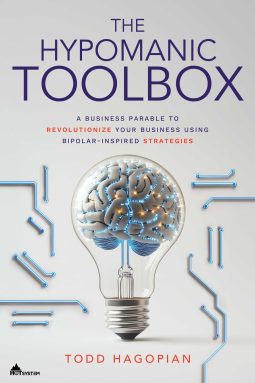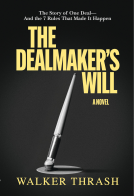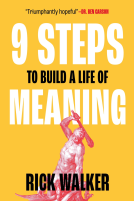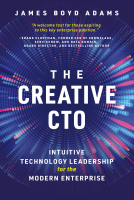The Hypomanic Toolbox
A Business Parable to Revolutionize Your Business Using Bipolar-Inspired Strategies
by Todd Hagopian
You must sign in to see if this title is available for request. Sign In or Register Now
Send NetGalley books directly to your Kindle or Kindle app
1
To read on a Kindle or Kindle app, please add kindle@netgalley.com as an approved email address to receive files in your Amazon account. Click here for step-by-step instructions.
2
Also find your Kindle email address within your Amazon account, and enter it here.
Pub Date 8 Sep 2025 | Archive Date 30 Sep 2025
Talking about this book? Use #hypomanictoolboxBusinessBusinessTransformation #NetGalley. More hashtag tips!
Description
Big Book Award Winner - Distinguished Favorite - Cross Genre
Firebird Book Award Winner - General Business
Literary Titan Book Award Winner
“We need to smash orthodoxies. We need to identify the unwritten rules that govern our industry—the things we do simply because that's how it's always been done.”
For fifteen years, Todd Hagopian climbed the corporate ladder at lightning speed while battling a devastating secret: bipolar disorder fueled both his remarkable success and nearly destroyed him. When medication finally stabilized Hagopian’s mind, he faced an impossible choice – Be healthy or be successful.
He refused this devastating ultimatum and developed the HOT System.
The Hypomanic Toolbox follows struggling manufacturing company president Jack Whelan as he meets Eugene Spark, an eccentric bipolar billionaire, who mentors Jack in implementing these breakthrough strategies.
Through this engaging story, discover how to:
● Drive extreme profitability by treating customers differently
● Implement weekly continuous improvement projects
● Set grandiose goals rather than underpromising
The HOT System breaks conventional business thinking by teaching leaders extreme focus, extreme goal-setting and extreme execution. This approach helps leaders think differently, like today’s most successful leaders. Ready to double your company's value in just three years?
"The Hypomanic Toolbox offers something genuinely rare in today's business book landscape: Actionable wisdom wrapped in an engaging story." —Ben Gay III, The Closers
Advance Praise
"Todd doesn’t glorify hypomania, he weaponizes it into an unfair advantage. This book is your invitation to think differently, act decisively and execute relentlessly. If you’re tired of managing from behind, this book is not optional reading. It’s required."
- Bill Canady, CEO of Arrowhead Engineered Products, Best-Selling Author of 80-20 CEO and From Panic To Profit
”Best business novelization since The Goal”
- Mark Blayney, Business Transformation Expert
What impressed me most is how the book transforms complex business principles into clear, implementable strategies through the vehicle of storytelling...Actionable wisdom wrapped in an engaging story."
- Ben Gay III, Best-Selling Author of “The Closers”, 5 million books sold. Executive Director, National Association of Professional Salespeople
“The idea of weaponizing mental health quirks into business edge? That's bold. And kind of brilliant."
Literary Titan
“Bold, unconventional and raw... Hagopian mined chaos to build a system: tools forged in the heat of hypomanic energy, refined for sustainable success.“
The Prairies Book Review"
“A game-changer for anyone striving to unlock their full potential and smash their KPIs. Offers a bold, practical roadmap to harness creativity and drive success."
Ryan Stemen, Senior Customer Success Manager - Thomson Reuters
Marketing Plan
Editorial Reviews (Advance praise section)
80+ ARCs sent to business leaders in my natural market
NetGalley & BookSirens Book Reviews
Three Goodreads promotions, giving away 100 copies each
Porchlight & BookPal for corporate book sales
Amazon Associates for affiliate sales
Free digital copy of Implementation guide included inside of book (QR code)
Available Editions
| EDITION | Hardcover |
| ISBN | 9798992607208 |
| PRICE | US$27.99 (USD) |
| PAGES | 243 |
Links
Available on NetGalley
Featured Reviews
I just finished The Hypomanic Toolbox by Todd Hagopian, and honestly, I didn’t expect a business book to hit this hard, both practically and emotionally. The story follows Jack Whelan, a manufacturing exec whose company is about to tank. He’s desperate, stressed, and honestly pretty burnt out. Then this eccentric billionaire, Eugene Spark, shows up and drops a wild proposition: turn the company around in six months using a system inspired by the focus and energy of hypomania, or lose the business entirely.
At first, I was like Jack, skeptical. But as Eugene started introducing his HOT System, I started to get pulled in. What makes this book different is how it blends a legit business transformation with a very real, human story. You’re not just reading strategies butyou’re watching them come alive through trial, error, and raw experience. Some of the concepts really stuck with me,
I think what I loved most, though, was the idea of “magnificent obsessions.” That’s where the creativity kicks in. And as a reader, it kind of makes you reflect on your own work and whether you're playing it too safe.
What’s so smart about this book is how it takes something misunderstood and often stigmatized (hypomania) and reframes it as a powerful force when channeled the right way. If you’re into business books with actual heart and don’t mind learning through story rather than straight-up theory, I seriously recommend this one. It’s practical, it’s different, and it’ll make you think twice about how you lead and create.
This was such a great read. I have been looking for a book to help me not only better understand my diagnosis, but also one that could help me manage the symptoms and this one was fantastic! I would absolutely recommend this read to anyone wanting better coping skills or even someone who loves a person with BP Type II or loves is hypomania.
Thank you to the author, NetGalley, and the publisher for allowing me to read this.
 Librarian 1738954
Librarian 1738954
An odd duck this one... Essentially the fictional story of how an eccentric billionaire turned around a shopping cart company via gathering a lot of data and applying it to their problems. If it's intention was to convince me of the importance of accurately measuring and tracking data in decision making, I am convinced. It was worth it for that although it was both uninteresting and strangely compelling at the same time. 4 stars as, unlike many self help fable books, it really did change mind.
 kamya ., Reviewer
kamya ., Reviewer
"The Hypomanic Toolbox is unlike any business book I've ever read—it's equal parts mystery, therapy session, and leadership masterclass. Todd Hagopian transforms his bipolar disease into a force for corporate innovation, and the results are electric. The story of Jack and Eugene had me enthralled from the first page—imagine a mad, genius billionaire swooping in to save a faltering firm with hyper-focused, 'no sleep till we win' enthusiasm.
The 'Karelin Method' (obsessive attention + unwavering execution) is my new productivity motto. What about the 'Magnificent Obsessions' framework? This is a game changer for fostering collaborative creativity. But the true gut-punch comes when Eugene disappears mid-mania, leaving Jack to adjust the system on his own—a fantastic metaphor for long-term leadership.
As someone who has experienced burnout,
I loved how Hagopian balances hypomanic intensity with guardrails to prevent chaos. 5/5—read this if you’re tired of ‘rah-rah’ business fluff and want real fire."
This book is a unique business parable that blends mental health insights with entrepreneurial strategy. Centered around Jack Whelan, the struggling president of Cartwell Manufacturing, the story introduces Eugene Spark—a billionaire with bipolar disorder—who mentors Jack using the HOT (Hypomanic Operational Turnaround) System. This system draws on traits often associated with hypomania, like creativity, energy, and risk-taking, to reinvigorate failing businesses.
Hagopian’s innovative approach reframes mental health traits as strategic assets, offering tools like the 80/20 Matrix and Karelin Method. The narrative is engaging, making abstract business concepts accessible. However, the book could benefit from more concrete implementation steps and deeper character development. The company’s rapid six-month transformation may also stretch believability.
Overall, it’s a thought-provoking read for entrepreneurs and managers looking for unconventional ways to drive growth and innovation, especially those open to psychological insights in business.
I was quite excited when Todd Hagopian reached out to me on LinkedIn to review his new book *The Hypomanic Toolbox*. I had a basic idea of what hypomania was and was genuinely curious to see how it connected with the world of business.
This business fiction follows Jack Whelan, the president of a cart manufacturing company. Just when he feels like he's failing on every front—professionally, personally, and in his relationships—he meets the enigmatic Eugene Spark. Eugene proposes an unconventional deal: he will either help turn the company around in six months using his unique system or buy it himself to save it from complete failure. Though unsure, Jack is desperate for a way out and decides to take the leap. What follows is a compelling journey where Eugene introduces Jack to the HOT System—Hypomanic Operational Turnaround—a method inspired by Eugene’s (and in many ways, the author’s) own life experiences of living with bipolar disorder.
In the foreword, Todd Hagopian opens up about his personal struggles with bipolar disorder and how it once adversely affected his life, until he developed and applied the very system the book is based on. That honest, lived connection makes the narrative feel even more authentic and impactful.
The story was so well written, I couldn’t put it down. I loved how business concepts were seamlessly woven into the narrative, making them easy to understand and much more engaging than traditional business books. The characters, especially Eugene, brought so much life to the story—they made it both informative and enjoyable to read. One strategy that especially resonated with me was “Make Bold Decisions Quickly,” which struck a personal chord as it’s something I often struggle with.
Even though the book tackles a heavy topic, it feels refreshingly different from typical business reads. I’ll definitely be re-reading it to better absorb the concepts because the possibilities the HOT System opens up are genuinely exciting.
If you're someone who enjoys business books with a fresh, storytelling approach—or if you’re just curious about the intersection of mental health and entrepreneurship—I’d definitely recommend *The Hypomanic Toolbox*. It’s insightful, gripping, and thought-provoking in the best way.
 sinan a, Reviewer
sinan a, Reviewer
"The Hypomanic Toolbox is a bold and refreshing take on entrepreneurial strategy. Hagopian masterfully blends storytelling with powerful insights, showing how energy, focus, and even intensity can be tools for growth — not just risks to avoid. Whether you're a founder, freelancer, or simply looking to break through a plateau, this book will challenge your assumptions and spark new ideas."
 Jimmy N, Reviewer
Jimmy N, Reviewer
I bet you would never have guessed that bipolar disorder could be a theme in a business fiction book. In Todd Hagopian’s debut novel- The Hypomanic Toolbox- we are ushered into the enigmatic world of harnessing a mental health disorder to achieve astonishing results without necessarily having to succumb to the undertows of hypomania.
In a resounding and very honest prologue, Todd unpacks what it means to leave with a mild form of bipolar (hypomania) and live to tell the tale (of both resounding successes and catastrophic failures). In a rather unexpected twist, the author figuratively reimagines his life as both an average company president, Jack Whelan, leading a fledgling cart business, Cartwell, and simultaneously as an eccentric billionaire, Eugine Spark, acting as a consultant for the firm.
The Hypomanic Toolbox illustrates, in excruciating detail, how the HOT (Hypomanic Operational Turnaround) system would function in an organization. Encapsulated in a complex web of Private Equity (P.E.) owners seeking to pull the plug lest they get a quick ROI in their portfolio, and Cartwell’s President facing immense pressure to deliver substantial profits in a short period; Jack bears the burden of offering value to their dwindling clients, battling stiff competition all while internally dealing with operational inefficiencies paired with unending office politics and demotivated staff.
As Cartwell walks the tightrope of imminent collapse, we are introduced to a hypomanic turnaround guru named Eugine Spark. As he offers his advice using the HOT system, one is left wondering whether there is indeed hope for Cartwell.
The mishaps of the day-to-day running of a manufacturing business are evident as one reads through the novel. The excessive details easily bog down a lay reader, especially one lacking interest in the manufacturing industry. Acronyms abound with limited memorability. Some feel contrived but creative.
While this is a business fable about corporate turnaround methods, the fiction writing style and mechanics need some work. However, Todd has indeed laboured to give his readers a glimpse of how one can succeed in their personal life and career while aptly managing the highs and lows of living with a mental health disorder like Bipolar.
Todd Hagopian has penned a business book that uses a fictional shopping cart manufacturer, Cartwell Manufacturing, and its president, Jack Whelan, to illustrate bipolar-inspired business concepts and strategies. In the prologue, the author speaks honestly and openly about his own journey and health condition. He wanted to harness the creativity, drive, and hyperfocus of his disorder while avoiding the destructive aspects. Over time, he developed a toolbox of processes, methodologies, and approaches that are illustrated through Jack’s and Cartwell’s story.
Jack is smart, hardworking, and dedicated, but his company is losing money, and its private equity owners aren’t sure he’s the person to turn it around. His journey starts with hope. He meets Eugene Spark at a mandatory leadership conference and his life changes. Jack ends up talking about his challenges at Cartwell and Eugene says he believes the problems can be solved in six months with his toolbox. He says if he can’t help Jack turn the company around in six months, he will buy to company from the private equity firm. Jack agrees to work with him.
From there, readers, Jack, and his leadership team are introduced to the toolbox one item at a time, but quickly, since they only have six months to solve their problems. Eugene asks for data (revenue by customer, revenue by part, and revenue by customer by part) while he and Jack tour and discuss the factory floor. They start with The Karelin Method: working harder, smarter, focusing on what truly matters, being more efficient, and believing in your ability to succeed. Next up was a leadership team evaluation by Jack and Eugene that resulted in some tough decisions. Other items included the 80/20 Matrix of Profitability, confronting change, building the right team, accountability, accelerated continuous improvement, innovation, rapid decision-making, empowerment, and more.
Not everything goes smoothly for Jack in the story in either his business or his personal life, but the concepts are well-illustrated with good storytelling and an appreciation for and insights into how they can be applied. They can work at the organizational level, but also at a team or individual level.
Overall, the book is thought-provoking and compelling with practical tools that can be utilized to drive success.
Koehler Books and Todd Hagopian provided a complimentary digital ARC of this novel via NetGalley. All thoughts and opinions expressed in this review are my own. The publication date is currently set for September 08, 2025.
 Nicole N, Reviewer
Nicole N, Reviewer
I received a free copy from NetGalley and I'm willingly giving my review
This is a business fiction illustrating the strategy. I am reviewing the story, not the system; that will come in the following books. The story is told in multiple POVs. In the prologue, the author talks about dream/work episodes. I have those and didn’t know other people had them too. I laughed at Jack’s description of Eugene while he was thinking he’d lost his mind agreeing to this. I found Eugene’s original visit to Jack’s company super interesting; he was looking into every tiny details. At some point, I thought the author could have chosen something else for some of the customer’s names (Jack’s Produce; “Jack” also being the main character’s name + Jacob’s; another employee at Cartwell). And in these times, we could have done without the reference to Musk. Mark was no surprised when he walked the whole perimeter of Eugene’s plan on the four walls; I was expecting that from him. A few repeats, such as Jacob - the man, not the company - being respected in the community, and the list of employees’ abilities and limitations around the table. Anyone else noticed that Eugene keeps referring to “our” – put any noun here – ? He’s right there with them. But one thing that did bother me was his approach of starting and deciding without consulting Jack or anyone else. It was rude and it was saying that he knows better than anyone – maybe he does, but it’s not his company. I’m glad they changed their HR personnel; HR is also to blame for not using the employees’ qualifications to their fullest (such as Maria and David). There are a couple of pages full of names and numbers and I had no idea what it meant; it was also not explained. Eugene knocked on a door a couple of times; since when does he asks for permission? I loved Claire’s interview and responses. I thought it was really funny that one company insisted on a certain color; if they asked the shoppers, I’m sure no one notice or care. I loved how realistic the employees reacted to new ideas, meetings, etc. and how, once they saw it was working, warmed up to the system – but not always. I love brain dumps and they use it a lot here.
Gripping, educational, creative, The Hypomanic Toolbox sheds light on bipolar disorder and the need to take calculated risks to succeed.
I would be lying if I said this book was my usual style. It is a far cry from the diversity-focused literature I usually read. I mean, business fiction—that’s a different one for me. But that’s just the thing: The Hypomanic Toolbox is different. It’s entertaining and applicable. It’s useful and eye-opening. It’s insightful and creative. It makes you feel like you have a stake in the company, needing to see the margins rise. It’s definitely worth a read.
Rating:
⭐⭐⭐⭐
Rating: 4 out of 5.
Review:
Jack isn’t doing the best… his personal life is a mess, struggling with alcohol and navigating divorced life. His professional life is a mess too, with his company about to crumble. That is, until he meets Eugene—an eccentric bipolar billionaire who has an idea. An idea that might just save his business. With nowhere else to turn, Jack accepts Eugene’s deal to entirely redesign his business practices. Now he just has to hope that it’s enough to turn his failing business around before it’s too late by implementing the HOT (Hypomanic Operational Turnaround) system.
The Hypomanic Toolbox is an oddly gripping book. You wouldn’t expect a book about redesigning the business practices of a fictional cart manufacturing company to be as exciting as it is, but something about it is thrilling. You immediately fall in love with the characters, however flawed, wanting them to succeed. Sure, Jack isn’t necessarily someone you admire, or even respect at times, but the reader can immediately feel sympathy for his vast struggles.
Beyond the gripping nature of this book, it truly is eye-opening. There aren’t that many books that feature characters with bipolar disorder, and The Hypomanic Toolbox illustrates it very well. It’s educational for those who don’t have bipolar disorder, allowing the reader to reshape whatever preconceived ideas they had. It’s empowering for those who do, showing how they can leverage it to their advantage—offering a key to making your greatest weakness or struggle into your most powerful tool. The Hypomanic Toolbox features important representation that is far too often overlooked.
Furthermore, The Hypomanic Toolbox makes complex business strategies approachable. Diving into The Karelin Method, the 80/20 Matrix, and more, this book explains everything in a way that anyone can understand. Whether you’re an entrepreneur or someone looking to broaden their reading horizons, The Hypomanic Toolbox is for everyone.
All in all, what struck me the most was how seamlessly the book weaves business concepts with human stories. Even if you have zero interest in manufacturing margins, the human element of the story pulls you in. I left this book not only entertained, but with a greater appreciation for how creativity, risk-taking, and neurodiversity can reshape entire industries.
I'm glad I don't run a business this size. One of the few shopping cart makers in America is featured, as a fictional demonstration of the principles espoused by the author. I would have liked to see more drawings, diagrams and charts, such as flow charts. We get some tables of figures.
A charmingly personal and vulnerable introduction explains how the author made and lost money and relationships, through his undiagnosed bipolar behaviour. The manic phase helped him work tirelessly, focus and generate ideas, some of them wild. The down phase knocked him for six and led him to think he was going to fail. This must have been extremely hard on his wife and kids.
The story begins with a factory making and selling shopping carts, they know who their competition is, their clients, and the bankers. They are working a great deal of overtime but not making money. The fictional boss calls in a fictional consultant who behaves like the author, sizing up the floor and staff, seeing the figures, and calling important meetings at short notice.
Some items seemed obvious to me - the low hanging fruit. Except, where the consultant says to eliminate small lines and odd runs, I would think there are contracts involved that could not be broken. I would be inclined to shunt those runs off to a new building as an offshoot of the firm, and let the main factory concentrate on the big sellers. This would get that odd inventory out of the way while keeping the clients and trying to talk them into accepting the standard products. Trucks are running engines while waiting in line to be loaded. Reduce greenhouse gases please.
Automating more processes is another bit of advice given, which is standard today. Firms are automating even a few processes on a production line worked by people, if not the whole line.
I am absolutely astounded that the consultant decides it's best to pay management more, because they are going through stress and will have to face changes, while not only halting pay increases for floor staff, but trying to remove most overtime. And nobody, but nobody, in management imagines that some of their workers depend on the overtime money. The floor staff are going through all the changes with the leaders and have the same bills as the boss.
The majority of workers we meet are male, but it's nice that the replacements for two managers are female. The bankers are male.
We also get a warning that bipolar symptoms can be harmful, and anyone suffering from this condition should keep taking the medicine and cut back on alcohol and driving.
There is some repetition through the story, but you can skip it if you've got the gist. This is an interesting presentation of business methods and I like the emphasis on saving jobs in the factory.
 Reviewer 294918
Reviewer 294918
Todd draws on his lived experience with bipolar disorder to craft a business parable that blends psychology, leadership, and storytelling. The book introduces the HOT System—Hypomanic Operational Turnaround—a set of tools designed to harness the creativity, drive, and focus associated with hypomania without succumbing to its destructive extremes. These tools include setting ambitious goals, creating competitive “battles,” maximizing efficiency, and fostering disruptive innovation.
The story follows Jack Whelan, president of a failing shopping cart company, who meets eccentric billionaire Eugene Spark. Eugene, who openly shares his struggles with bipolar disorder, mentors Jack in applying the HOT System. Through this guidance, Jack revitalizes his company, boosting efficiency, morale, and innovation. Yet his journey is not only about business—it also explores balance, personal growth, and the cost of overwork.
Todd’s blend of memoir, parable, and management advice makes the book accessible and engaging. While not a traditional textbook, it provides practical, scalable lessons for employees, managers, and executives alike. At its heart, the book conveys a powerful message: our challenges—even those rooted in mental health—can be transformed into sources of strength when understood and applied with discipline.
Readers who liked this book also liked:
Kala Montena
Business, Leadership, Finance, Computers & Technology, Science
Walker Thrash
Business, Leadership, Finance, Literary Fiction, Mystery & Thrillers
James Boyd Adams
Business, Leadership, Finance, Computers & Technology, Nonfiction (Adult)
Dean Foster
Business, Leadership, Finance, Multicultural Interest, Nonfiction (Adult)
Lynn Bruines
Biographies & Memoirs, Business, Leadership, Finance, Self-Help
Alice Driscoll; Louise Haarst
Business, Leadership, Finance, Health, Mind & Body, Self-Help



















